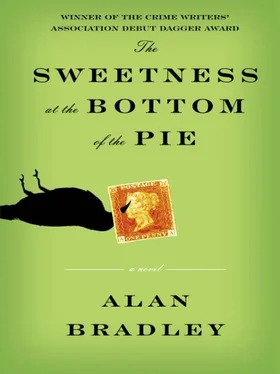Alan Bradley - The Sweetness at the Bottom of the Pie
Здесь есть возможность читать онлайн «Alan Bradley - The Sweetness at the Bottom of the Pie» весь текст электронной книги совершенно бесплатно (целиком полную версию без сокращений). В некоторых случаях можно слушать аудио, скачать через торрент в формате fb2 и присутствует краткое содержание. Жанр: Старинная литература, на английском языке. Описание произведения, (предисловие) а так же отзывы посетителей доступны на портале библиотеки ЛибКат.
- Название:The Sweetness at the Bottom of the Pie
- Автор:
- Жанр:
- Год:неизвестен
- ISBN:нет данных
- Рейтинг книги:3 / 5. Голосов: 1
-
Избранное:Добавить в избранное
- Отзывы:
-
Ваша оценка:
- 60
- 1
- 2
- 3
- 4
- 5
The Sweetness at the Bottom of the Pie: краткое содержание, описание и аннотация
Предлагаем к чтению аннотацию, описание, краткое содержание или предисловие (зависит от того, что написал сам автор книги «The Sweetness at the Bottom of the Pie»). Если вы не нашли необходимую информацию о книге — напишите в комментариях, мы постараемся отыскать её.
The Sweetness at the Bottom of the Pie — читать онлайн бесплатно полную книгу (весь текст) целиком
Ниже представлен текст книги, разбитый по страницам. Система сохранения места последней прочитанной страницы, позволяет с удобством читать онлайн бесплатно книгу «The Sweetness at the Bottom of the Pie», без необходимости каждый раз заново искать на чём Вы остановились. Поставьте закладку, и сможете в любой момент перейти на страницу, на которой закончили чтение.
Интервал:
Закладка:
"Where have you been, you little beast?" she hissed, springing up and coming at me like a wildcat, her eyes swollen and as red as cycle reflectors. "Everyone's been searching for you. We thought you'd drowned. Oh! How I prayed you had!"
Welcome home, Flave, I thought.
"Father's been arrested," Daffy said matter-of-factly. "They've taken him away."
"Where?" I asked.
"How should we know?" Ophelia spat contemptuously. "Wherever they take people who have been arrested, I expect. Where have you been?"
"Bishop's Lacey or Hinley?"
"What do you mean? Talk sense, you little fool."
"Bishop's Lacey or Hinley," I repeated. "There's only a one-room police station at Bishop's Lacey, so I don't expect he's been taken there. The County Constabulary is at Hinley. So they've likely taken him to Hinley."
"They'll charge him with murder," Ophelia said, "and then he'll be hanged!" She burst into tears again and turned away. For a moment I almost felt sorry for her.
I CAME OUT OF THE DRAWING ROOM and into the hallway and saw Dogger halfway up the west staircase, plodding slowly, step by step, like a condemned man ascending the steps of the scaffold.
Now was my chance!
I waited until he was out of sight at the top of the stairs, then slipped into Father's study and quietly locked the door behind me. It was the first time in my life I had ever been alone in the room.
One full wall was given over to Father's stamp albums, fat leather volumes whose colors indicated the reign of each monarch: black for Queen Victoria, red for Edward the Seventh, green for George the Fifth, and blue for our present monarch, George the Sixth. I remembered that a slim scarlet volume tucked between the green book and the blue contained only a few items—one each of the nine known variations of the four stamps issued bearing the head of Edward the Eighth before he decamped with that American woman.
I knew that Father derived endless pleasure from the countless and minute variations in his bits of confetti, but I did not know the details. Only when he became excited enough over some new tidbit of trivia in the latest issue of The London Philatelist to rhapsodize aloud at breakfast would we learn a little more about his happy, insulated world. Apart from those rare occasions, we were all of us, my sisters and me, babes in the wood when it came to postage stamps, while Father puttered on, mounting bits of colored paper with more fearsome relish than some men mount the heads of stags and tigers.
On the wall opposite the books stood a Jacobean sideboard whose top surface and drawers overflowed with what seemed to be no end of philatelic supplies: stamp hinges, perforation gauges, enameled trays for soaking, bottles of fluid for revealing watermarks, gum erasers, stock envelopes, page reinforcements, stamp tweezers, and a hooded ultraviolet lamp.
At the end of the room, in front of the French doors that opened onto the terrace, was Father's desk: a partner's desk the size of a playing field, which might once have seen service in Scrooge and Marley's counting house. I knew at once that its drawers would be locked—and I was right.
Where, I wondered, would Father hide a stamp in a room full of stamps? There wasn't a doubt in my mind that he had hidden it—as I would have done. Father and I shared a passion for privacy, and I realized he would never be so foolish as to put it in an obvious place.
Rather than look on top of things, or inside things, I lay flat on the floor like a mechanic inspecting a motorcar's undercarriage, and slid round the room on my back examining the underside of things. I looked at the bottoms of the desk, the table, the wastepaper basket, and Father's Windsor chair. I looked under the Turkey carpet and behind the curtains. I looked at the back of the clock and turned over the prints on the wall.
There were far too many books to search, so I tried to think of which of them would be least likely to be looked into. Of course! The Bible!
But a quick riffle through King James produced no more than an old church leaflet and a mourning card for some dead de Luce from the time of the Great Exhibition.
Then suddenly I remembered that Father had plucked the Penny Black from the bill of the dead snipe and put it in his waistcoat pocket. Perhaps he had left it there, meaning to dispose of it later.
Yes, that was it! The stamp wasn't here at all. What an idiot I was to think it would be. The entire study, of course, would be at the very top of the list of too-obvious hiding places. A wave of certainty washed over me and I knew, with what Feely and Daffy incorrectly call “female intuition,” that the stamp was somewhere else.
Trying not to make a sound, I turned the key and stepped out into the hall. The Weird Sisters were still going at it in the drawing room, their voices rising and falling between notes of anger and grief. I could have listened at the door, but I chose not to. I had more important things to do.
I went, silent as a shadow, up the west staircase and into the south wing.
As I expected, Father's room was in near-darkness as I stepped inside. I had often glanced up at his windows from the lawn and seen the heavy drapes pulled tightly shut.
From inside, it possessed all the gloom of a museum after hours. The strong scent of Father's colognes and shaving lotions suggested open sarcophagi and canopic jars that had once been packed with ancient spices. The finely curved legs of a Queen Anne washstand seemed almost indecent beside the gloomy Gothic bed in the corner, as if some sour old chamberlain were looking on dyspeptically as his mistress unfurled silk stockings over her long, youthful legs.
Even the room's two clocks suggested times long past. On the chimneypiece, an ormolu monstrosity, its brass pendulum, like the curved blade in “The Pit and the Pendulum,” tock-tocking away the time and flashing dully at the end of each swing in the subdued lighting of the room. On the bedside table, an exquisite little Georgian clock stood in silent disagreement: Her hands were at 3:15, his at 3:12.
I walked down the long room to the far end, and stopped.
Harriet's dressing room—which could be entered only through Father's bedroom—was forbidden territory. Father had brought us up to respect the shrine that he had made of it the day he learned of her death. He had done this by making us believe, even if we were not told so outright, that any violation of his rule would result in our being marched off in single file to the end of the garden, where we would be lined up against the brick wall and summarily shot.
The door to Harriet's room was covered with green baize, rather like a billiard table stood on end. I gave it a push and it swung open with an uneasy silence.
The room was awash in light. Through the tall windowpanes on three of its sides poured torrents of sunshine, diffused by endless swags of Italian lace, into a chamber that might have been a stage-setting for a play about the Duke and Duchess of Windsor. The dresser top was laid out with brushes and combs by Fabergé, as if Harriet had just stepped into the adjoining room for a bath. Lalique scent bottles were ringed with colorful bracelets of Bake lite and amber, while a charming little hotplate and a silver kettle stood ready to make her early morning tea. A single yellow rose was wilting in a vase of slender glass.
On an oval tray stood a tiny crystal bottle containing no more than a drop or two of scent. I picked it up, removed the stopper, and waved it languidly under my nose.
The scent was one of small blue flowers, of mountain meadows, and of ice.
A peculiar feeling passed over me—or, rather, through me, as if I were an umbrella remembering what it felt like to pop open in the rain. I looked at the label and saw that it bore a single word: Miratrix .
Читать дальшеИнтервал:
Закладка:
Похожие книги на «The Sweetness at the Bottom of the Pie»
Представляем Вашему вниманию похожие книги на «The Sweetness at the Bottom of the Pie» списком для выбора. Мы отобрали схожую по названию и смыслу литературу в надежде предоставить читателям больше вариантов отыскать новые, интересные, ещё непрочитанные произведения.
Обсуждение, отзывы о книге «The Sweetness at the Bottom of the Pie» и просто собственные мнения читателей. Оставьте ваши комментарии, напишите, что Вы думаете о произведении, его смысле или главных героях. Укажите что конкретно понравилось, а что нет, и почему Вы так считаете.












